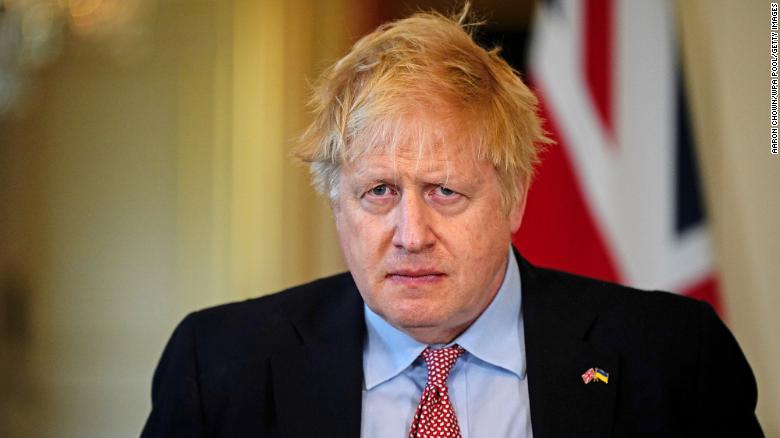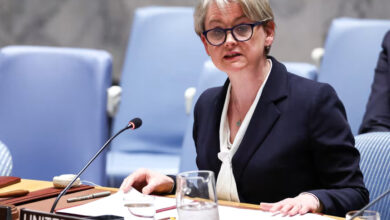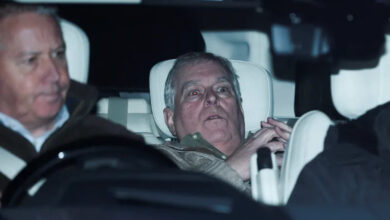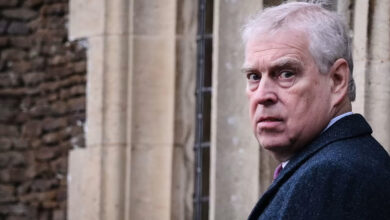
London (CNN) – Boris Johnson has been able to end what might have otherwise been a troubling week with an unexpected sigh of relief.
On Thursday, it was announced that the British Prime Minister would not receive any further fines from the Metropolitan Police over the “Partygate” scandal that has dogged Johnson for months.
Despite being the first UK premier in history found to have broken the law in office, and people working in Downing Street receiving hundreds of police fines for breaching Covid regulations that Johnson himself made, the end of this police investigation significantly reduces the risk of another smoking gun the PM’s enemies can use to get rid of him.
Johnson, however, is still a long way from being out of the woods when it comes to Partygate.
Next week, senior civil servant Sue Gray will publish her report into the scandal, which is likely to be highly critical of Johnson.
Once that report is published, a Parliamentary Committee will then be able start an investigation into Johnson in which it will ultimately rule on whether or not Johnson deliberately misled parliament when he denied any rule-breaking had taken place in No 10. Any minster who knowingly misleads parliament would be expected to resign from their post.
As hard as it may be to believe, Johnson could ride out both of these events. Even harder to believe, it’s not even the biggest problem he faces in the coming months.
The cost of living crisis that Britons are currently experiencing and how the government handles it is likely to dominate the political agenda until the next general election, scheduled for 2024.
Conservative MPs are unconfident that Johnson has the solution to this crisis. One former cabinet minister, a long-term critic of Johnson, points to the fact Johnson has dragged his feet on placing a windfall tax on energy companies who have benefited from the hike in prices for consumers.
“He’s already been too slow. Even if the government does tax the energy companies, they will remember he didn’t do it soon enough,” the former minister says. “I am afraid that this, combined with the impression he lied over parties, means the damage is already done for many who voted for him in 2019. And the next election is when the party is punished for his errors,” they add.
It’s not just Johnson critics who are feeling gloomy. One senior MP who supported Johnson’s leadership bid in 2019 told CNN that even among the PM’s supporters, there was a sense that the cost-of-living crisis will get worse and the government “won’t have a plan before it’s too late” and will have to hold “an emergency budget, which will allow (opposition party) Labour to dance on our grave,” for letting it get so bad.
There are other pitfalls awaiting Johnson. Only this week, one of his MPs was arrested on suspicion of rape. This is taking place against the backdrop of many MPs being under investigation for sexual misconduct, with members of Johnson’s cabinet believed by government insiders to be on that list.
The list of issues for which the Prime Minister is under fire seemingly grows by the week: from accusations of being soft on immigration to undermining the structural integrity of the whole country, not to mention possibly starting a trade war with his nearest trading partner.
All the while, his approval ratings remain poor and his party trails in the polls on almost all issues.
Despite this, most Conservatives believe he will fight the next general election as prime minister and party leader. They point to a lack of a smoking gun, a lack of backbone among MPs to sack him, and the almost religious belief some Conservatives have that he really is the chosen one who can overcome all odds.
“For some of them, he really is ‘Indiana Boris.’ He can be above the pit of lava one minute and out ruffling his hair the next,” says one senior Conservative.
Despite this devotion, Johnson and his party are suffering in the polls. Their latest woes are underscored by the fear among Conservative party insiders that, for the first time since taking office, a clear path to government exists for the leader of the opposition Labour party, Keir Starmer.
Conservative sources privately admit that they believe it is possible that as things stand, the next election could result in a formal or informal coalition between Labour and the centrist Liberal Democrat party. This is significant, as it would mean Labour would not need the Scottish National Party to form a government, which would almost certainly come at the cost of another referendum on Scottish independence.
The Conservatives have previously campaigned hard, using the idea of a “coalition of chaos” as a primary attack line against the Labour Party. However, Labour officials think that this attack won’t work as 2024 approaches for two main reasons.
First, without the Scottish referendum, a significant part of the the chaos is eliminated. Second, as one Labour official put it, “we’ve been through some of the most turbulent years in recent history with the Conservatives in power. Clearly they are the agents of chaos.”
Labour officials stressed to CNN that there would be no formal pact with anyone ahead of the election, but did concede that it would be prudent to focus campaigning and resources on the seats they are more likely to take from the Conservatives.
They also stressed that they want Johnson to fight the next election. “He is just so toxic, and despite the damage he does to his party he keeps hanging on,” says one opposition source.
All of this leaves British politics, in the medium term, in a strange place. Johnson doesn’t want to go anywhere. Those in his party who want him gone have no smoking gun. The opposition wants him to stay firmly in place.
In the face all of the turbulence, all the anger directed at the government, the sense that something huge is about to happen, the fate of Boris Johnson remains stuck in the same state of limbo it’s been for much of this year.
And without something inconceivably dramatic happening before the next election, it’s entirely plausible it will remain that way for the next two years. Which, arguably, is not a great thing for the people of a country living through its worst cost-of-living crisis in decades.




